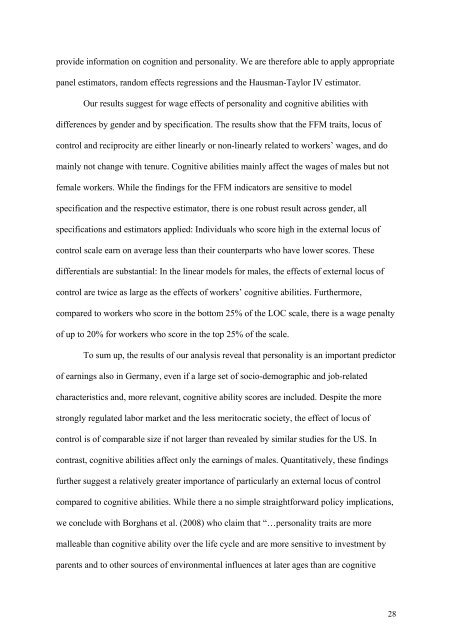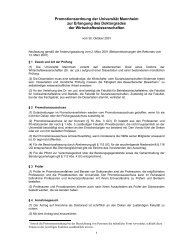The returns to cognitive and non-cognitive abilities in Germany
The returns to cognitive and non-cognitive abilities in Germany
The returns to cognitive and non-cognitive abilities in Germany
You also want an ePaper? Increase the reach of your titles
YUMPU automatically turns print PDFs into web optimized ePapers that Google loves.
provide <strong>in</strong>formation on cognition <strong>and</strong> personality. We are therefore able <strong>to</strong> apply appropriate<br />
panel estima<strong>to</strong>rs, r<strong>and</strong>om effects regressions <strong>and</strong> the Hausman-Taylor IV estima<strong>to</strong>r.<br />
Our results suggest for wage effects of personality <strong>and</strong> <strong>cognitive</strong> <strong>abilities</strong> with<br />
differences by gender <strong>and</strong> by specification. <strong>The</strong> results show that the FFM traits, locus of<br />
control <strong>and</strong> reciprocity are either l<strong>in</strong>early or <strong>non</strong>-l<strong>in</strong>early related <strong>to</strong> workers’ wages, <strong>and</strong> do<br />
ma<strong>in</strong>ly not change with tenure. Cognitive <strong>abilities</strong> ma<strong>in</strong>ly affect the wages of males but not<br />
female workers. While the f<strong>in</strong>d<strong>in</strong>gs for the FFM <strong>in</strong>dica<strong>to</strong>rs are sensitive <strong>to</strong> model<br />
specification <strong>and</strong> the respective estima<strong>to</strong>r, there is one robust result across gender, all<br />
specifications <strong>and</strong> estima<strong>to</strong>rs applied: Individuals who score high <strong>in</strong> the external locus of<br />
control scale earn on average less than their counterparts who have lower scores. <strong>The</strong>se<br />
differentials are substantial: In the l<strong>in</strong>ear models for males, the effects of external locus of<br />
control are twice as large as the effects of workers’ <strong>cognitive</strong> <strong>abilities</strong>. Furthermore,<br />
compared <strong>to</strong> workers who score <strong>in</strong> the bot<strong>to</strong>m 25% of the LOC scale, there is a wage penalty<br />
of up <strong>to</strong> 20% for workers who score <strong>in</strong> the <strong>to</strong>p 25% of the scale.<br />
To sum up, the results of our analysis reveal that personality is an important predic<strong>to</strong>r<br />
of earn<strong>in</strong>gs also <strong>in</strong> <strong>Germany</strong>, even if a large set of socio-demographic <strong>and</strong> job-related<br />
characteristics <strong>and</strong>, more relevant, <strong>cognitive</strong> ability scores are <strong>in</strong>cluded. Despite the more<br />
strongly regulated labor market <strong>and</strong> the less meri<strong>to</strong>cratic society, the effect of locus of<br />
control is of comparable size if not larger than revealed by similar studies for the US. In<br />
contrast, <strong>cognitive</strong> <strong>abilities</strong> affect only the earn<strong>in</strong>gs of males. Quantitatively, these f<strong>in</strong>d<strong>in</strong>gs<br />
further suggest a relatively greater importance of particularly an external locus of control<br />
compared <strong>to</strong> <strong>cognitive</strong> <strong>abilities</strong>. While there a no simple straightforward policy implications,<br />
we conclude with Borghans et al. (2008) who claim that “…personality traits are more<br />
malleable than <strong>cognitive</strong> ability over the life cycle <strong>and</strong> are more sensitive <strong>to</strong> <strong>in</strong>vestment by<br />
parents <strong>and</strong> <strong>to</strong> other sources of environmental <strong>in</strong>fluences at later ages than are <strong>cognitive</strong><br />
28















